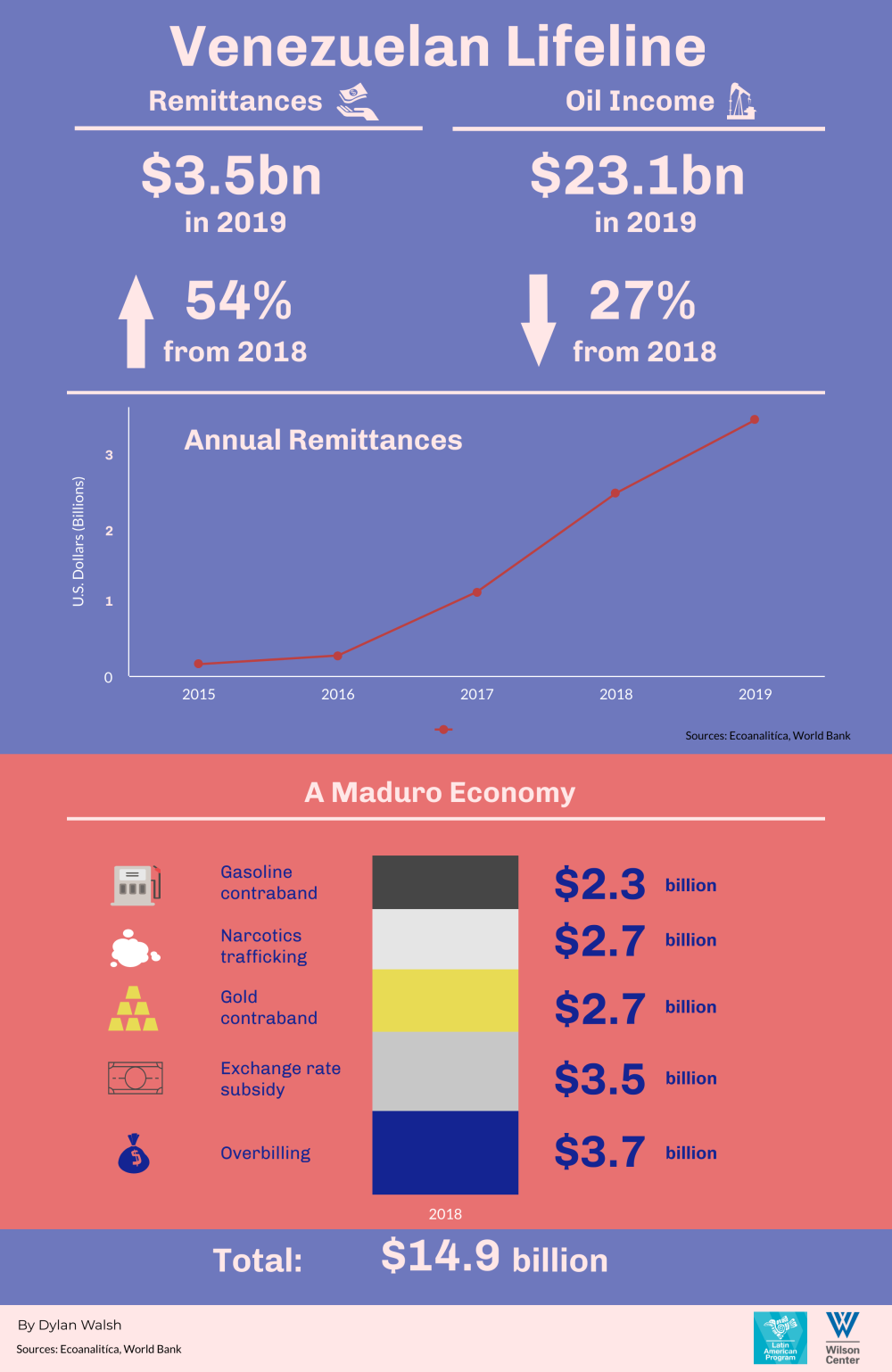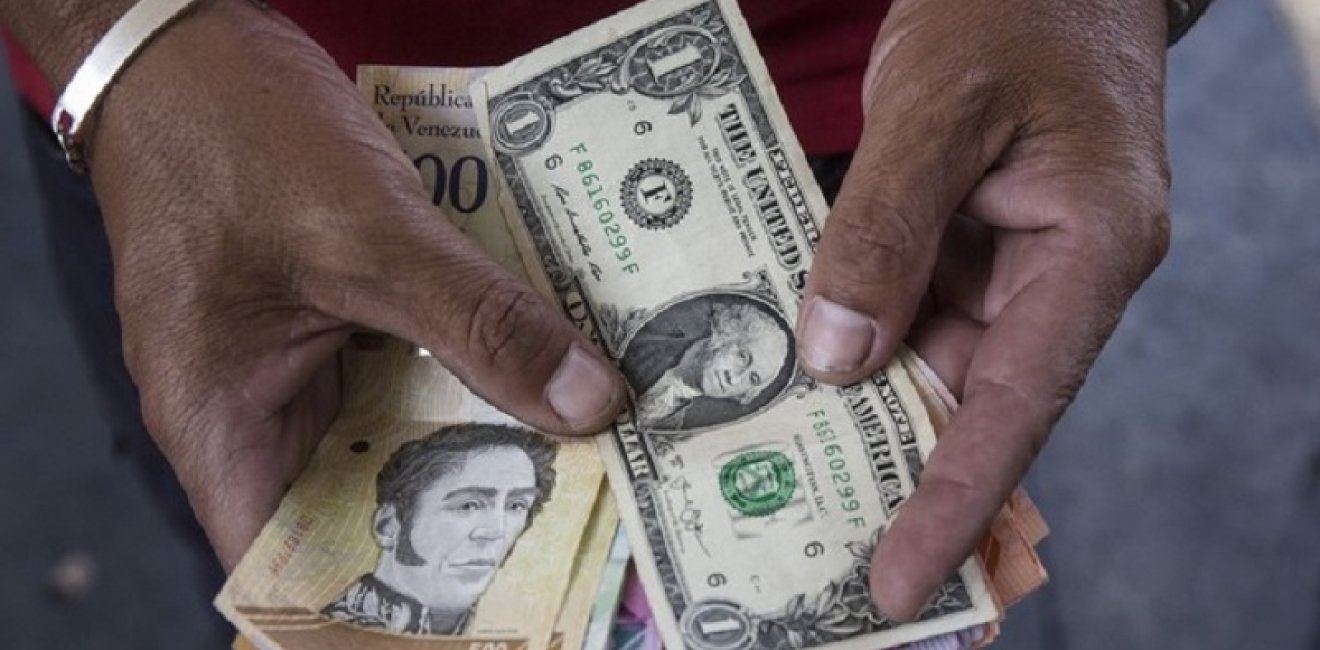
A blog of the Latin America Program
Amid Venezuela’s Exodus, Remittances Boom
By Beatriz García Nice
Since Venezuelan President Nicolás Maduro took power in 2013, over 4.5 million Venezuelans have fled the country, leaving behind violent crime, food and medicine shortages and an economy convulsed by mismanagement, hyperinflation, a collapse in oil production and international sanctions.
In the past, Venezuela had been one of the region’s most prosperous countries, awash in cash thanks to the oil boom that began in the 1970s. In those days, it was a magnet for foreign laborers, whose incomes helped support their families throughout Latin America.
Today, those roles have stunningly reversed.
As Venezuela empties out, those who remain increasingly depend upon the growing diaspora to survive. By 2003, Venezuela was a net recipient of remittances and by 2017, those flows made up 43 percent of foreign exchange earnings. This year, it is estimated that annual remittances will reach $4 billion – the second-largest source of foreign currency after oil. Already, more than half of transactions in Venezuela use U.S. dollars.
Venezuela is not alone in its dependence on remittances. Last year, Latin American countries received $96 billion in remittances, a 7.8 percent increase from 2018. Mexico was the region’s largest recipient, attracting $35 billion, exceeding the value of its sizable oil exports.
But given Venezuela’s staggering economic decline, its dependency on remittances has grown unusually fast. That is why policies toward displaced Venezuelans, both in the region and in the United States, are so consequential, even beyond the humanitarian considerations. The threat of tougher migration laws in Ecuador, Peru, Chile and Colombia, for example, threaten to curtail the growth in remittances that serve as a lifeline for so many Venezuelans.
Venezuela’s unexpected source of dollars has also had salutary macroeconomic effects, a phenomenon grudgingly acknowledged by Mr. Maduro. “This process that they call dollarization,” he said recently, “thank God it exists.” Until 2018, the regime had limited the use of U.S. dollars, but after years of hyperinflation and empty store shelves, it adopted a less ideological posture toward the U.S. currency. Today, throughout Caracas, imported goods are suddenly available again, at least for the minority of Venezuelans with access to dollars.
Despite the policy changes, remittances do not typically flow through official channels. Often, Venezuelans abroad send money directly to relatives using digital payment methods, including cryptocurrencies. That reduces transaction costs, government intervention (and data collection).
Remittances are not the only new source of foreign exchange in Venezuela’s heavily sanctioned economy. Other innovations, for example, include illicit gold mining and narcotics trafficking.
But remittances are arguably the least discussed and most unexpected new source of dollars, as no one anticipated the scale of the Venezuelan exodus. Despite the macroeconomic upsides to remittances and dollarization, Venezuelans continue to leave in large numbers, ballooning the flows of dollars into their isolated homeland.

Author


Latin America Program
The Wilson Center’s prestigious Latin America Program provides non-partisan expertise to a broad community of decision makers in the United States and Latin America on critical policy issues facing the Hemisphere. The Program provides insightful and actionable research for policymakers, private sector leaders, journalists, and public intellectuals in the United States and Latin America. To bridge the gap between scholarship and policy action, it fosters new inquiry, sponsors high-level public and private meetings among multiple stakeholders, and explores policy options to improve outcomes for citizens throughout the Americas. Drawing on the Wilson Center’s strength as the nation’s key non-partisan policy forum, the Program serves as a trusted source of analysis and a vital point of contact between the worlds of scholarship and action. Read more


Argentina Project
The Argentina Project is the premier institution for policy-relevant research on politics and economics in Argentina. Read more

Explore More in Weekly Asado
Browse Weekly Asado
Dengue Haunts South America’s Summers

Lessons from Costa Rica’s Economic Transformation

Women and Latin America’s Digital Revolution

